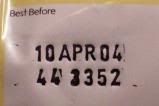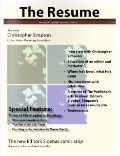• Best Before #1
The customer as moron
The concept
Upon using the client's product or service, the consumer is overcome with an inability to function in a normal fashion. He or she (generally he) becomes incapable of normal social interaction, loses all interest in sex, and is often oblivious to physical danger.
Examples
- Arby's: A young couple sits by the side of a lake at night. When the beautiful woman suggests a dip and runs to the water taking off her clothes, her boyfriend repeats the word "dip" a couple of times and then drives off for an Arby's beef dip sandwich.
- Casino Rama: Another man, another attractive woman, another lake. After having spent the night at Casino Rama, the man is unable to pay attention to her because...well, it's not clear, really. At one point we see the world through his eyes and there's a vague bright spot in the centre of his vision but at another point he asks if the cloud doesn't look like a motorocycle. Not only is it insulting, but it makes no sense.
- A&W: A young man is so enraptured by the burger he's eating that he completely fails to notice the young woman flirting with him, and uses the napkin on which she has written her phone number to wipe his mouth. (I've already written about A&W dumbing-down what started out as an intelligent, mature, and amusing campaign.)
The problem
Is it even necessary to spell it out? Maybe there's a point to portraying those who don't use your product as stupid, although perhaps insulting the people you're trying to seduce has its drawbacks. But where is the logic in making your own customers look like idiots?
Common sounds making a rhythmic tune
The concept
A series of natural taps, bangs, or other sounds combine to form a tune or distinct rhythm.
Examples
- Maxwell House: The first, and probably most effective, would have to be the Maxwell House percolator. This was so successful that while it hasn't been aired for decades (percolators having been replaced with drip), those of us old enough to have grown up with the original ads can still remember the tune.
- Folgers: More recently, Folgers has tried to duplicate the phenomenon. As a couple prepares breakfast in the kitchen, each item they put down adds another "note" to the tune. Unfortunately, the Folgers "tune" is not particularly distinctive and it takes repeated viewings for the intent to become clear.
- Can't remember: In a remarkably forgettable commercial, the entire family beats out a pointless rhythm and then they all look extremely pleased with themselves.
The problem
While there's nothing wrong with the actual concept, making it work takes real genius, and there's just not a lot of that going around. The Maxwell House ads succeeded because the tune was catchy and the creation of the tune (a percolator) was directly tied to the product. None of the ads since have managed to pull off the same formula. Until they do, it's time to put this one to bed.
Our product sucks, but it's much better now
The concept
In an honest recognition that the company's product has been inferior in the past, these commercials ask the consumer to give it another shot, with the promise that it has vastly improved.
Examples
- Ford: For over 25 years now, Ford has been begging the public to give it another chance. "Have you driven a Ford...lately?" is the longest-running incarnation of this plea. "We know that in the past our cars have pretty much fallen apart while driving off the lot," they're saying, "but it's all fixed now...really."
- Oldsmobile: While it wasn't plagued with the same history of mechanical breakdowns as Ford, the Oldsmobile was burdened with the reputation of being an old man's car -- and the name didn't help. In an effort to make it more hip, they launched a campaign claiming, "This isn't your father's Oldsmobile," then went bankrupt a short time later.
- Microsoft: Blatantly acknowledging that Vista was the biggest mistake since Windows 2000, Microsoft tried to win the hearts and minds of consumers with an incredibly transparent campaign called "The Mojave Experiment." In it, people were introduced to Vista under the name "Mojave" and, when they saw it running on high-end, perfectly-configured machines, many declared that they liked it. Real consumers, oddly enough, weren't fooled.
The problem
While it may seem like a good idea to be honest and admit to past failures, in real life it seldom does anything more than remind everyone about your past failures. More importantly, those coming to your brand with no previous knowledge of its past performance will learn to distrust it from your own ads. Your best bet? Improve the product from the ground up, then start advertising it on its features. Ignore the past.
That's it for this edition of Best Before. We'll have another in the future. If you have any suggestions for campaign concepts that really need to be taken down from the shelf, feel free to e-mail them to me. I'll give full credit.
Read more...





